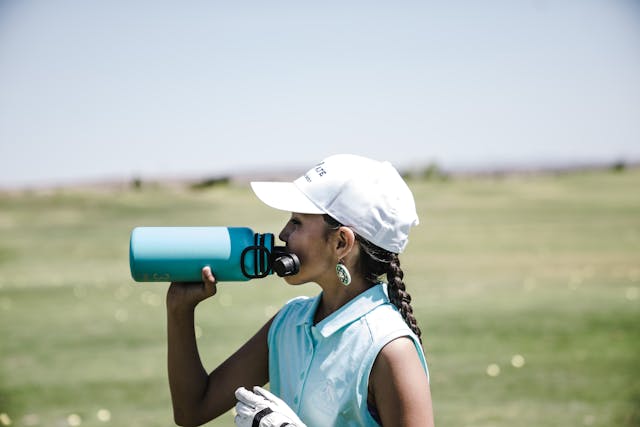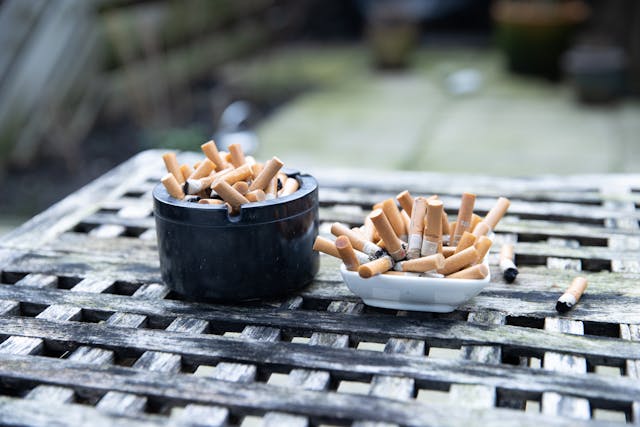Key takeaways
- Smoking diminishes body hydration, causing lethargy.
- Nicotine's diuretic effect leads to dehydration symptoms.
- Hot weather and caffeine worsen smoking-induced dehydration.
- Quitting smoking enhances hydration and skin appearance.
- Nicotine replacement aids quitting while managing dehydration.
Many people recognize the dangers smoking poses to their health, but fewer realize the toll it takes on the body’s hydration.
When your fluid levels drop, you may feel sluggish, fatigued, or even lightheaded at times.
In today’s post, we’ll break down how smoking contributes to dehydration and what you can do to maintain proper hydration, especially after quitting.
How Smoking Leads to Dehydration
Nicotine is one of the main reasons smoking drains your body’s water supply. Beyond the smoke drying out your throat, nose, and airways, nicotine itself acts as a diuretic.
Chat to a prescriber
Bulk-billed phone consultations
TGA-authorised clinicians
Nicotine vaping scripts available
Diuretics stimulate the body to produce more urine, which means you lose fluids faster. Frequent bathroom visits take a big toll on hydration, and smokers often need to drink more water just to keep up.
Research has shown that nicotine lowers hydration levels compared to those who don’t smoke or vape.
While you can temporarily counter this effect by drinking water after each cigarette, the most effective solution is to quit smoking altogether, eliminating the dehydration issue at its source.
Other Factors That Contribute to Dehydration

Although smoking and nicotine play a big role in fluid loss, other everyday factors can make dehydration worse if you’re already a smoker:
Hot Weather: Dehydration tends to spike in the summer and in warmer climates. Smoking during these times accelerates water loss even more. If you do smoke, carry water with you and avoid lighting up during the hottest hours of the day.
Not Enough Water Intake: Some people are diligent about drinking enough water, but many aren’t mindful of reaching the recommended daily intake. Smokers who don’t track their hydration are especially vulnerable to worsening dehydration.
Caffeine: Many smokers pair cigarettes with coffee, soda, or tea. But caffeine is another diuretic, and when combined with nicotine, it greatly speeds up fluid loss. This duo not only disrupts your hydration balance but can also interfere with your sleep.
Physical Activity: Physically demanding jobs—like carrying heavy loads, waiting tables, or making deliveries—cause your body to sweat and lose water more quickly than sedentary work. If you smoke and work in an active role, it’s especially important to increase water intake or, better yet, stop smoking to avoid constant fatigue and dizziness.
Does Smoking Dehydrate Your Skin?
Hydration is essential to the skin. Water balances the acid levels in your body, which helps it look younger and glowing all the time.
While washing your face and body with water daily helps, drinking enough water flushes toxins out of your body. It also helps maintain skin elasticity, reducing wrinkles, scars, and soft lines on your face and any part of the body.
However, even if you have proper hydration while you consume tobacco, you might still see sagging skin, acne growth, frequent skin infections due to your weaker immune system, and other symptoms.
To have good-looking skin throughout the years, consider quitting smoking and improving your hydration levels throughout the process.
Can Quitting Smoking Improve My Hydration Levels?

After you quit smoking, you’ll feel much lighter. In just six days, you’ll feel less anxious as your heart rate and blood pressure levels return to normal levels.
Quitting cigarettes after a week also improves your body’s antioxidant levels, which improves your immune system. Consuming zero tobacco will also make you feel less dizzy and lightheaded and make you able to focus much more on what you need to do.
While quitting may not be easy for everyone, it is undoubtedly the most effective way to address the problem.
Many stop-smoking tools today, such as nicotine replacement therapy (NRT) and nicotine vaping products (NVPs) from pharmacies, make quitting much more manageable – just consult a GP to know more.
Staying Well-Hydrated While Quitting
NRT products and NVPs sold in pharmacies still contain nicotine, which can cause dehydration, but without the dangerous chemicals in cigarette smoke. While on your way to quitting cigarettes, you can stay well-hydrated by doing the following:
Drink Lots of Water: Maintain a consistent water intake to counteract the diuretic effects of nicotine, even while using NRT products or NVPs. You can set up a reminder on your watch or smartphone to reinforce the habit daily.
Take Breaks: Regular hydration might seem simple, but it’s something that’s easy to forget, especially if you only have short breaks in your routine to hydrate and refresh.
Even if you have a critical task at hand or a busy day of moving boxes or waiting tables, take breaks and drink water.
Limit Alcohol Intake: Alcohol is also a diuretic, and when combined with nicotine from NRT products or NVPs, it can further dehydrate you.
While these greatly help you resist lighting a cigarette when spending time around smokers, high alcohol consumption can still cause your hydration levels to plummet, so drink moderately and responsibly.
How to Access Pharmacy-Sold Vaping Products

If you’re ready to quit smoking with the help of the quit-smoking aids available today, here are the steps you can follow through.
Go Through First-Line Solutions First
You need a nicotine prescription before you can purchase NVPs. As a second-line solution, one requirement is that you’ve already tried and failed to quit smoking with a first-line treatment, such as NRT products.
NRT products (like patches and gums) are the most trusted quitting option available for motivated smokers. They might not imitate cigarettes, but they contain a small dose of nicotine that may be enough to alleviate your withdrawals.
While NRTs can be effective, they don’t work for everyone. If these haven’t done the trick for you, you may now be eligible for a nicotine prescription.
Chat to a GP
As mentioned, NRT products have worked for many successful ex-smokers. But, you might have ingrained behaviours and triggers that only something that mimics a cigarette can successfully address, such as the hand-to-mouth motion, and needing something to use while having a drink with friends.
If your GP deems it necessary, they can write you a nicotine prescription for NVPs.
You can chat to your usual GP more about this.
Visit Your Local Pharmacy
Once you have your nicotine prescription, you can pop down to your local pharmacy. Over 2,200 pharmacies across Australia hold these products in-store, but any pharmacy can order these in for you if they don’t currently stock them.
Both your pharmacist and GP can advise you on how best to use the product, such as the initial setup, and the number of puffs to take when you feel withdrawals.
Summary
Smoking can make you dehydrated. While drinking lots of water while consuming tobacco can keep the symptoms at bay, quitting cigarettes is the best way to ensure your body is well-hydrated, performs well, and keeps you on your toes throughout the day.
If you need help in stopping smoking, we can help you.
Smokefree Clinic gives you access to many medically reviewed and trustworthy resources that can inform and aid you in your path to wellness, so have a look around!
If you’re ready to get started, Smokefree can connect you to Australian healthcare professionals who excel in helping patients quit smoking for good.
Link Reference
- https://www1.maine.gov/mdot/challengeme/topics/2022/06June/

